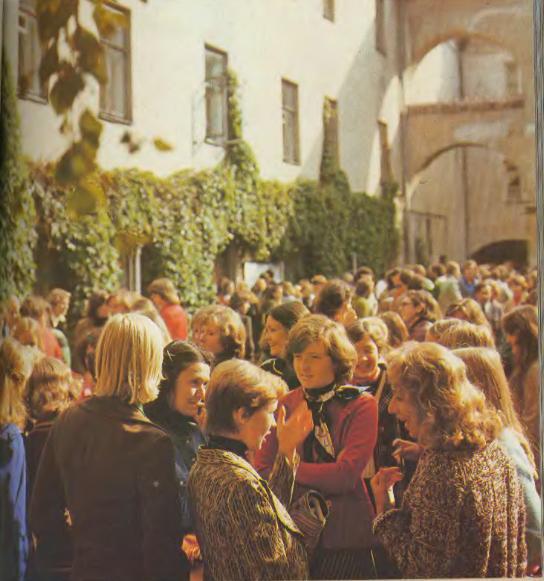
Zehra Yilmaz, an English teacher from Turkey, made the decision to embark on a journey toward a Master's degree in English Studies at the Faculty of Philology, Vilnius University. Throughout her academic pursuit, she embraced the opportunity to immerse herself in a multicultural academic environment, which not only broadened her understanding of language, literature, and culture but also ignited a multitude of new ideas for her teaching career. Reflecting on her transformative experience, Zehra Yilmaz confidently asserts that her studies in English have significantly elevated her teaching abilities, positioning her as an outstanding and impactful educator.
What role do you think English studies play in today's globalized world? How has your education at Vilnius University prepared you to navigate the challenges and opportunities in the field of English education? Where did you hear about Vilnius University and how did you decide to move to study abroad?
English Studies has a significant place in the world of globalization as English has become the language of international communication, particularly in business, and academia. Specializing in English Studies allows for a variety of choices, including global career prospects, academic collaborations, and cultural exchanges. The university fostered critical thinking and research skills, which are essential in navigating the challenges and opportunities in the field of English education. I have expanded my knowledge and research skills by writing more research papers and developing research proposals on subjects. Within the Individual Study Plan framework, I also found the opportunity to choose elective subjects outside the field of study. So, I had the chance to take a comprehensive course like “Language and Education”, which is directly related to the field of my bachelor's degree.
I first learned about Vilnius University through online research while seeking study-abroad options. Vilnius University popped up in the top English studies rankings, and its academic excellence reputation drew my attention. Then, I discovered that Vilnius University had a rich history, a supportive academic community, and a vibrant cultural scene.
Can you tell us about your background and what motivated you to pursue a Master's degree in English studies at Vilnius University?
I hold a Bachelor's degree in English Language Teaching from Istanbul University, which gave me a solid foundation in language acquisition theories, teaching methodologies, and practical classroom experience. During my Erasmus Program experience at Cologne University, I was exposed to a multicultural environment that deepened my passion for English education and intercultural exchange. Motivated by these experiences, I decided to pursue a Master's degree in English studies at Vilnius University.
How would you describe your overall experience studying English at Vilnius University? Did it meet your expectations? Why or why not?
When I reflect on my time at Vilnius University, I can confidently say that it has helped me become a better teacher in many ways. Through the linguistics seminars, I was challenged to explore areas I had not considered in detail before, and the literature and culture seminars provided me with new perspectives, enabling me to take a closer and more critical look at literary texts and cultural phenomena. In my role as a teacher, I have been able to revise my teaching practice using these new values and develop a greater sense of confidence. In particular, I have been able to create more critical assessments and formulate new discussion topics for my students, providing them with fresh and interesting ideas to engage with. I believe that these are the ripples of studying at Vilnius University, and I am grateful for the knowledge and skills that I gained during my time there.
Could you share an example of a research project or thesis you worked on during your Master's program? How did it contribute to your understanding of English studies?
Certainly! One research project I worked on during my Master's program in English studies focused on the field of British Cultural Studies. Specifically, I examined the challenges of translating poetry by diaspora poets who had experienced migration, refuge, or similar life experiences. The project aimed to explore how the unique cultural and linguistic elements embodied in their poems could be effectively conveyed in another language. By delving into this topic, I believe that I gained a deeper understanding of diaspora identities and the experiences of migrants. One other experience was the pleasant communication I had with my academic supervisor while working on my master's thesis, which greatly helped me resolve the issues I encountered regarding my thesis.
As an alumna of Vilnius University, how has your English studies degree contributed to your career progression as a teacher? Are there any specific skills or knowledge areas you acquired that have been particularly valuable?
First and foremost, the depth of knowledge I acquired during my studies, particularly in the field of linguistics, has been instrumental in my role as a language teacher. It has given me a solid foundation in understanding linguistic concepts. This knowledge allows me to effectively analyze and explain language structures to my students, helping them develop a strong grasp of the English language. Certainly, teaching a language is not solely about those fields I mentioned. Learning and teaching a language also requires understanding the culture it embodies. It also entails examining the literature. Therefore, the comprehensive structure of English Studies, encompassing linguistics, literature, and culture, has positively contributed to my profession as well.
If you were to give advice to prospective students considering pursuing English studies at Vilnius University, what would it be? Are there any specific aspects of the program or university experience you would highlight?
As an international student, it's crucial to feel a sense of belonging and not be alone while studying abroad. Vilnius University is a place where you will encounter friendly faces, and make you feel welcome.


